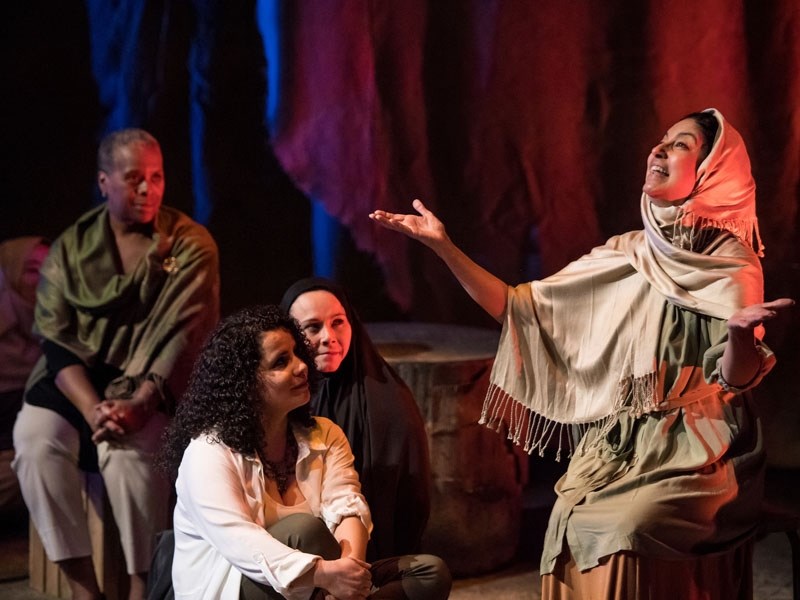The atrocities happening in the Middle East viewed on television are brutal, yet they have a sanitized feel.
Iraqi-American playwright Heather Raffo’s 9 Parts of Desire, now enjoying its Edmonton premiere at the Varscona Theatre, is completely bloodless.
Yet it delivers a chill that terrifies and makes you wonder if we have learned anything about the tragic repercussions from past wars.
Set in what could be a partially burned out shelter, 9 Parts of Desire is extraordinarily relevant to the sabre-rattling going down between the United States and Russia over Syria’s latest chemical weapons attack on innocent women and children.
The Maggie Tree only mounts one production each year, yet that single choice always leaves a thought-provoking impression and is extremely influential.
This one-act play frames the lives of nine Iraqi women telling their poignant and stomach clenching stories while living under the savage dictatorship of Saddam Hussein.
Presented as a series of vignettes, the women are from a cross-section of society living in a basic survival mode and enduring struggles from within their war-torn country.
Theirs are not the words of politicians, but of the common people, and are all the more powerful in showing how politics and war are not easy to control and can change an individual or a country’s destiny forever.
This theatrical mosaic not only deals with the predicaments of Iraqi women, but it also raises serious questions about the morality of war.
Most of the stories are disturbing chronicles about loss of freedom and being trapped, conflicting beliefs, and seeing a proud nation ravaged by a mad despot. Contrasting the tales of bloodshed are stories laced with romance and perseverance. All are told with passion.
The 90-minute production was originally envisioned as a one-woman show, a Herculean task for one woman switching personalities, accents and gestures.
However, director Vanessa Sabourin, a former St. Albert Children’s Theatre alumna, has chosen nine different actresses who successfully add a multitude of layers.
The play starts with Mullaya (Christine Frederick), a sombre woman who leads the call to women at funerals. She speaks with poetic beauty, yet there is only decay and death in her call.
The second character Layal (Amena Shehab) is the main character and is the most fully fleshed out. Layal is a sexy liberated artist and curator at Saddam Art Centre. She is privileged and the only artist permitted to paint nudes.
She was forced into sexual relations with one of Saddam’s sons and watched the execution of one of her girlfriends who was stripped, smeared with honey and torn apart by dogs.
“Just a simple act of loving can make one suffer greatly,” she says admitting she is both complicit and suffocating within the regime.
Hudu (Patricia Darbasie) is an aging communist who has spent her life travelling the world protesting for peace. She now questions her values. Drinking glasses of scotch, she tells us numerous stories including how Saddam kidnapped women and turned them into sex slaves. Then one summer, he beheaded 70 prostitutes, she says, and there was no law to protect them.
Umm Jhada (Natasha Prasad), a quiet woman, lives at the site of an exploded bomb shelter. She lost her entire family in the shelter during an American bombing run. The bomb’s explosion burst the pipes and hot water rushed into the shelter boiling 400 people alive.
“Skin and bones were stuck to the wall,” she states matter-of-factly.
Life is equally hard for The Doctor (Nadien Chu), a British educated doctor now working at an Iraqi hospital. Supplies are limited and she sees a high rate of shocking genetic changes in babies including one born with two heads.
Perhaps she surmises, “It’s the bullets dipped in depleted uranium.” And then she asks, “How many generations will grow up handicapped?”
Raffo also includes the character of an Iraqi-American living in exile in Manhattan (Nicole St. Martin), far away from the violence. Unable to make contact with her relatives, she indulges in trivial pursuits to stay sane. But she cannot enjoy life because she stresses and feels guilty.
This episodic play is at times jarring and the lyrical, poetic dialogue requires a second viewing to comprehend its full magnitude.
But what matters in 9 Parts of Desire is its documented authenticity, a realistic and powerful wakeup call to the suffering of ordinary people.
Review
9 Parts of Desire<br />The Maggie Tree<br />Runs until Saturday, April 15<br />Varscona Theatre<br />10329 – 83 Ave.<br />Tickets: Call 780-420-1757 or at tixonthesquare.ca




